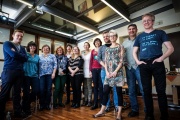ExplOERer
|
edit
AboutThe ExplOERer project (pronounced ‘explorer’) is a European Commission co-funded project, under the Erasmus+ [1] programme. The project duration is from September 2014 to August 2016. ExplOERer promotes OER sustainability through OER adoption and embeddedness in professional practice. The consortium will identify, document and assess obstacles and opportunities, and analyse current practice in the use of OER, including the sustainability aspect. This will be achieved by capitalising on opportunities in cross-boundary contexts in which OER are part of innovation, and by developing education practitioners’ digital and pedagogical skills regarding OER reuse and repurposing. Several types of learning contexts are addressed, including adult education, higher education and the workplace. The project adopts a cross-sectoral approach by involving six European partners: three Higher Education Institutions, a Ministry of Education supporting a large OER repository, a private company specialising in OER and social networking/gaming, and a non-profit organisation leading the field in open licensing and open education. The results of the project will be produced in partner languages (EN, GR, NL, PL and SE) and widely disseminated through regional, national, European and international channels. edit
Rationale
The ExplOERer project (pronounced ‘explorer’) promotes OER sustainability through OER adoption and embeddedness in professional practice. The consortium will identify, document and assess obstacles and opportunities, and analyse current practice in the use of OER, including the sustainability aspect. This will be achieved by capitalising on opportunities in cross-boundary contexts in which OER are part of innovation, and by developing education practitioners’ digital and pedagogical skills regarding OER reuse and repurposing. Several types of learning contexts are addressed, including adult education, higher education and the workplace. The project will target the following intellectual outputs:
The project adopts a cross-sectoral approach by involving six European partners: three Higher Education Institutions, a Ministry of Education supporting a large OER repository, a private company specialising in OER and social networking/gaming, and a non-profit organisation leading the field in open licensing and open education. The results of the project will be produced in partner languages (EN, GR, NL, PL and SE) and widely disseminated through regional, national, European and international channels. edit
Disclaimer |
edit
Partners
edit
Eventsedit
Work packages1) Co-creation of guidelines for training of adult educators on OER reuse. This process will directly involve teachers to increase engagement and improve sustainability. This set of activities is led by Allison Littlejohn and Isobel Falconer 2) Development of training materials and teacher training in OER reuse and digital skills through an Open Online Course. This set of activities is led by Anna Comas-Quinn 3) Design improvements by means of embedding social networking and gaming mechanics in OER repositories. This set of activities is led by Katerina Zourou 4) Stimulation and support for policy development regarding OER uptake through three multiplier events, online and face-to-face expert seminars resulting in policy recommendations. This set of activities is led by Alek Tarkowski. |


